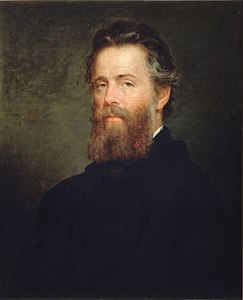Analysis of L'Envoi
Herman Melville 1819 – 1891
_The Return of the Sire de Nesle._
A.D. 16
My towers at last! These rovings end,
Their thirst is slaked in larger dearth:
The yearning infinite recoils,
For terrible is earth.
Kaf thrusts his snouted crags through fog:
Araxes swells beyond his span,
And knowledge poured by pilgrimage
Overflows the banks of man.
But thou, my stay, thy lasting love
One lonely good, let this but be!
Weary to view the wide world's swarm,
But blest to fold but thee.
| Scheme | XX XAXA XBXB XCXC |
|---|---|
| Poetic Form | |
| Metre | 101101011 1 110111101 11110101 01010001 110011 1111111 110111 01011100 100111 11111101 11011111 10110111 111111 |
| Closest metre | Iambic tetrameter |
| Characters | 443 |
| Words | 84 |
| Sentences | 9 |
| Stanzas | 4 |
| Stanza Lengths | 2, 4, 4, 4 |
| Lines Amount | 14 |
| Letters per line (avg) | 25 |
| Words per line (avg) | 6 |
| Letters per stanza (avg) | 88 |
| Words per stanza (avg) | 20 |
Font size:
Submitted on May 13, 2011
Modified on March 05, 2023
- 25 sec read
- 381 Views
Citation
Use the citation below to add this poem analysis to your bibliography:
Style:MLAChicagoAPA
"L'Envoi" Poetry.com. STANDS4 LLC, 2024. Web. 27 Apr. 2024. <https://www.poetry.com/poem-analysis/19080/l%27envoi>.


Discuss this Herman Melville poem analysis with the community:
Report Comment
We're doing our best to make sure our content is useful, accurate and safe.
If by any chance you spot an inappropriate comment while navigating through our website please use this form to let us know, and we'll take care of it shortly.
Attachment
You need to be logged in to favorite.
Log In